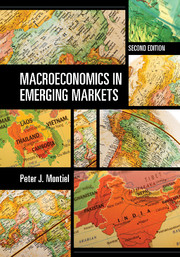Book contents
- Frontmatter
- Contents
- Preface
- PART 1 THE MACROECONOMIC FRAMEWORK
- PART 2 A BENCHMARK MACROECONOMIC MODEL
- PART 3 PUBLIC FINANCE AND MACROECONOMIC PERFORMANCE
- PART 4 MONETARY INSTITUTIONS AND MONETARY POLICY
- PART 5 EXCHANGE RATE MANAGEMENT
- PART 6 THE FINANCIAL SECTOR AND MACROECONOMIC PERFORMANCE
- 20 Finance, Welfare, and Growth
- 21 Financial Repression
- 22 Financial Reform
- 23 The Benchmark Model with Banks
- 24 Coping with Capital Inflows
- PART 7 VARIETIES OF EMERGING-MARKET CRISES
- Index
- References
21 - Financial Repression
Published online by Cambridge University Press: 05 June 2012
- Frontmatter
- Contents
- Preface
- PART 1 THE MACROECONOMIC FRAMEWORK
- PART 2 A BENCHMARK MACROECONOMIC MODEL
- PART 3 PUBLIC FINANCE AND MACROECONOMIC PERFORMANCE
- PART 4 MONETARY INSTITUTIONS AND MONETARY POLICY
- PART 5 EXCHANGE RATE MANAGEMENT
- PART 6 THE FINANCIAL SECTOR AND MACROECONOMIC PERFORMANCE
- 20 Finance, Welfare, and Growth
- 21 Financial Repression
- 22 Financial Reform
- 23 The Benchmark Model with Banks
- 24 Coping with Capital Inflows
- PART 7 VARIETIES OF EMERGING-MARKET CRISES
- Index
- References
Summary
Despite the contributions that an efficient financial system can make to economic welfare and growth, many developing countries have traditionally applied a combination of policies toward the financial sector that has impeded the functioning of their domestic financial systems. This policy package has become known as financial repression. This chapter will describe this set of policies and consider how they affect the functioning of the financial system as well as how they may impinge on each of the channels through which the financial system can promote growth. We will also review some of the evidence on the growth effects of financial repression in developing countries. As we will see, a substantial amount of evidence is available suggesting that financial repression has had harmful effects on economic growth.
In part because of this evidence, the view that financial repression is harmful for growth has carried the day among policy makers in emerging markets, and most emerging economies are well along in the process of revamping their policies toward the financial sector, a process known as financial liberalization. But this process has not proven to be an easy one. We will examine it in detail in the next chapter. As we will see there, a key question is what conditions have to be in place in the domestic economy for a liberalization of the domestic financial system to have a chance of being successful.
- Type
- Chapter
- Information
- Macroeconomics in Emerging Markets , pp. 497 - 524Publisher: Cambridge University PressPrint publication year: 2011



